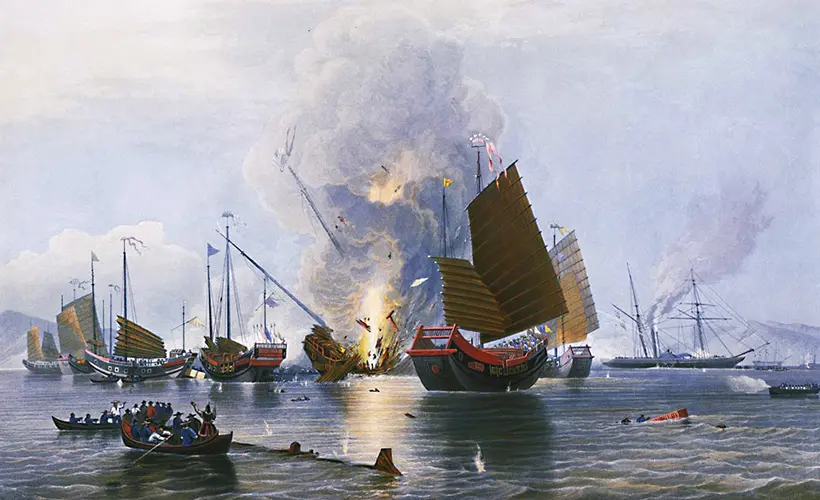Opium War: A Historical Controversy from Issues & Controversies in History

A Historical Spotlight from Issues & Controversies in History:
OPIUM WAR: Was Great Britain Justified in Going to War with China?
Should Great Britain have gone to war with China? Be sure to check out Issues & Controversies in History’s complete and unbiased coverage of this issue. Learn more about the issue and check out a sample of the pro/con arguments on both sides below.
[minti_button link=”https://freetrial.infobase.com/” size=”large” target=”_blank” lightbox=”false” color=”color-3″ icon=””]Try Issues & Controversies in History today![/minti_button]
THE ISSUE
In the early 19th century, the opium trade was illegal in China, but British merchants still did a brisk business by smuggling the illicit drug into the country, transporting it from British-controlled India, where it was grown. In 1839, the Chinese government launched a major crackdown on the opium trade—closing the port of Canton and confiscating traders’ opium. In response, the British government chose to deploy a naval force against the Chinese, thus officially starting the Opium War. Did Chinese actions justify the British decision to go to war? Or did British leaders allow economic and other considerations to overwhelm their inherent distaste for the opium trade?
[minti_table style=”2″]
| Arguments for Going to War with China: | Arguments Against Going to War with China: |
| British interests in China are best served by supporting the opium trade, which has proven to be a reliable and prolific source of revenue. The sale of opium has economic benefits for Great Britain and India that outweigh the moral repugnance associated with this drug. For many years, Britain suffered from an imbalance of trade with China, having to use precious silver to purchase Chinese products such as tea and silk because China had little interest in British-produced goods. But Chinese people do want opium, and selling it enables Britain to preserve its silver supply and improve its balance of trade with China. Furthermore, China’s arrogant statements and actions have become intolerable. Its trade regulations, insulting treatment of British merchants and officials, and blockade of Canton justify the use of force. | First of all, opium is an evil substance. People who take this poison become enfeebled addicts, unable to work or carry out their regular responsibilities. The drug ruins their lives and the lives of their families. The opium trade with China, therefore, is immoral and un-Christian and goes against the values Britons cherish. Supporting it makes the British people accomplices in the traffic of a pernicious drug and in the destruction that it wreaks and tarnishes the nation’s character. China has outlawed the use, sale, and importation of opium. How can Great Britain justify backing a product that must be secretly smuggled into another country? If the reverse were true—if Chinese merchants were smuggling opium into Britain—the British people would be outraged and demand a halt. It is utterly wrong to go to war with China to defend the right to sell an illegal drug. |
[/minti_table]
Issues & Controversies in History links this pro/con article to rich related resources that enhance the debate. Students and researchers can delve into primary sources that provide context, a topic-specific timeline, a bibliography, and a thought-provoking “What if…” section that explores what might have happened had things worked out differently. Plus, discussion questions are provided to inspire critical thinking and analysis.
What Is Issues & Controversies in History?
Issues & Controversies in History places students at the center of the great debates and conflicts in U.S. and world history, exploring the issues as the key players saw them or, in some cases, as historians have interpreted them. This comprehensive reference database delivers dynamic, concise, and balanced coverage of a broad range of topics, from slavery, empire, and revolution to race, gender, economy, and disease, all over the globe. By building a deeper understanding of how historical events and conflicts have influenced U.S. and world history over the past 5,000 years, Issues & Controversies in History is a powerful tool for helping researchers analyze primary sources, answer document-based questions, and prepare for history debates and research projects.
Click here to take a free trial of Issues & Controversies in History.
See also:
- Yalta Agreement: A Historical Controversy from Issues & Controversies in History
- Equal Rights Amendment: A Historical Controversy from Issues & Controversies in History
- Keating-Owen Child Labor Act: A Historical Controversy from Issues & Controversies in History
- For Primary Sources, Make Infobase Your First Stop